Why this conference
A major part of our work involves talking to our customers, partners and friends across the globe. As we connect with you, we learn about the challenges you face. Some are unique, yet we see many commonalities across the global legal landscape. We also discover opportunities for improvement and we see ways in which we can address these challenges together.
Are laws universal and can we find a common thread between what is legal and what isn’t across jurisdictions? As the world connects and people cross borders, are we increasingly forced to reference laws across borders? If so, what are our limitations and how can we put this into practice? As technology propels us all to the future, how has the law evolved to meet this new reality? How do the judiciary and law enforcement deal with modern-day challenges? How prepared are we as a global community to connect pieces of this puzzle?
The LexisNexis Rule of Law Conference 2013, an invitation-only event brought together judges, prosecutors, lawyers and academicians in one setting. This two-day conference featured a keynote address, actual case studies and panel sessions which discussed law reform, provided a closer look at Myanmar and its law reform efforts, a robust discussion on cyber crime, financial crime, intellectual property, technology and more. All these issues are transnational and these issues were addressed, taking us beyond our national laws.
We take great pride in the fact that our expert panels of speakers are passionate about these issues and there was certainly a robust interaction amongst our speakers and guests throughout the entire event.
To view pictures from the event, visit www.facebook.com/lexisnexishk
Welcome Speech by Shawn Clark, LexisNexis CEO
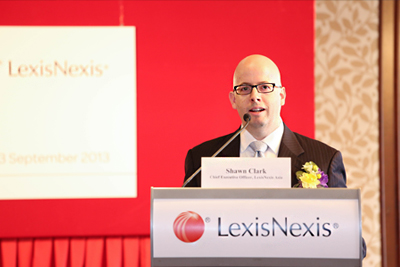
Honourable members of the judiciary, distinguished speakers, ladies and gentlemen.
It is with great pride that I welcome you this morning to the inaugural LexisNexis Rule of Law Conference. I am honoured to be your host here in Hong Kong during these two days and my colleagues and I thank you for joining us.
A special thank you to our speakers who have travelled from the Netherlands,Cambodia,Malaysia, Japan and the UK to share your expertise and your passion on the topics we will be exploring during the next two days.
Advancing the rule of law around the world is a concept that unifies LexisNexis globally and is passionately supported by our teams. This is because we believe that the rule of law is essential to political stability, economic opportunity, and progress of society. Our efforts include:
1. Providing products that enable customers to excel in the practice of law and help justice systems, governments and businesses to function more effectively, efficiently and transparently.
We continuously engage with you - our customers, friends and partners to find ways in which we can do this better and we strive to provide you with the tools to help support this ecosystem.
2. Documenting local, national and international laws and making them accessible in multiple formats to individuals and professionals in the public and private sectors.
We operate in more than 100 countries around the world and there are thousands of my colleagues working on making laws transparent, accessible and consumable in multiple jurisdictions as we speak. We work together across borders and we make connections between you, bringing laws from all these jurisdictions closer to you and we take great pride in doing so.
3. Partnering with governments and non-profit organizations to help make justice systems more efficient and transparent.
Where our expertise is needed, we gladly provide it. In many countries across Africa, we work directly with the government to document and make laws available and accessible to their citizens. Most recently, in Myanmar we are embarking on a major rule of law initiative to support the creation of a transparent legal system.
We also partner with organizations such as the United Nations and the Atlantic Council, amongst others in many initiatives, all with the goal of supporting efficient and transparent justice systems.
4. Supporting corporate citizenship initiatives that strengthen civil society and the rule of law across the globe.
For over a decade, the Wall Street Journal and The Heritage Foundation have tracked economic freedom around the world creating benchmarks that gauge economic success into what they call the
Index of Economic Freedom. Countries with higher levels of economic freedom substantially outperform others in economic growth, per capita incomes, health care, education, protection of the environment, and reduction of poverty.
One of the 4 pillars of this index is the Rule of Law. A nation’s economic success depends on the ability of her citizens to own property, to live in a society free from corruption, one in which the man on the street knows his rights and is empowered by them, able to speak freely because of them and is able to prosper because of this transparency.
For me, as an individual and as a parent, advancing the rule of law really resonates. It is my way of helping to improve the world so that my children and their children will continue to live in a world that is just, where no man is above the law and their rights are protected.
This brings me to this conference. Why are we here?
As we constantly talk with you and hear from you from all around the world, we see a common theme and hear a common message. The world is growing closer and our worlds are increasingly overlapping. There is a need for some form of uniformity where the law is unclear. The law develops at a rapid pace and in different parts of the world. This is a natural result of society, economy and government in different nations. If we leverage on the developments of the law across jurisdictions, surface them, share them, discuss them and critique them, we are more informed -- as a group, we are smarter -- and thus, become stronger.
Today, we focus on the practical aspects of law reform. We will begin with a keynote lecture on Good Governance, Human Rights and the Rule of Law. This demonstrates how critical the rule of law is to society and reminds us again why we are here and what we care about. Our panel sessions address reform in financial crimes and criminal justice systems. We also feature a case study on law reform in Myanmar. You will be part of intense and stimulating discussions on law reform and learn from our speakers, the real and practical challenges associated with them.
It is our hope that the sessions today not only demonstrate the critical need for law reform but also how reform affects the justice system in practice. We hope to discover ways in which we can undertake law reform better.
Tomorrow, you will hear from members of the judiciary about modern day judicial challenges. The world is changing and evolving and we will learn how the judiciary, in their role adapt to this new fast changing world. Our case study features the Dutch Knowledge Centre for Cyber Crime. We will discuss cases where technology outpaces the law and we will also hear how a comparative approach to judicial decision making is the way in which we will move forward.
The theme of our conference this year is “A Transnational Dialogue”. I hope that this platform we are providing you with will stimulate many such dialogues. We are all here to learn, share and exchange views and together, we will bond and grow in strength.
We at LexisNexis will continue on in our purpose that is to advance the rule of law across the globe. We want to hear from you, share our platform and our voice with you and I urge you to keep us in mind when you are embarking on a similar undertaking. There are many of my colleagues here today and you also know where to find us. It would be a privilege for us to be part of your journey.
I look forward to personally getting to know you during these two days.
And now, I am pleased to introduce our keynote speaker, Mr. Andrew Cayley. He was appointed in 2009 by Ban Ki-moon, Secretary General of the United Nations and the King of Cambodia to serve as Chief International Co-Prosecutor of the Khmer Rouge Tribunal, part of the Extraordinary Chambers in the Courts of Cambodia. He currently leads the prosecution of several persons responsible for genocide and crimes against humanity.
Mr. Cayley is an expert in his work, having led prosecutions and given input on prosecutions against war crimes in the former Yugoslavia, Kosovo and Darfur, amongst others. He is a highly sought after speaker and has delivered lectures in prominent platforms around the world. We are privileged to have him here with us today and welcome him.
Our Speakers
To view the full profiles of each of our speakers as well as read up on the Judgments, please download the full program booklet here
Mr. Andrew Cayley, QC [UK]
Chief International Co-Prosecutor
The Extraordinary Chambers of the Courts of Cambodia (ECCC)
United Nations Assistance to the Khmer Rouge Trial (UNAKRT)
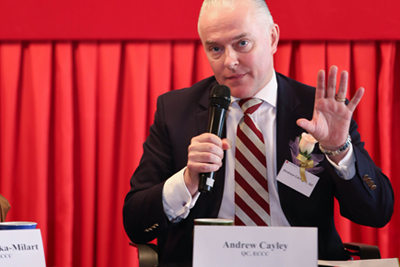
Appointed in 2009 by Ban Ki-moon (Secretary General of the UN) and His Majesty Norodom Sihamoni (king of Cambodia), Mr Cayley has served as Chief International Co-Prosecutor of the Khmer Rouge Tribunal, part of the Extraordinary Chambers in the Courts of Cambodia. He currently leads the prosecution of several persons responsible for genocide and crimes against humanity.
Judge Rowan Downing, QC [Australia]International Judge
The Extraordinary Chambers of the Courts of Cambodia (ECCC)
United Nations Assistance to the Khmer Rouge Trial (UNAKRT)
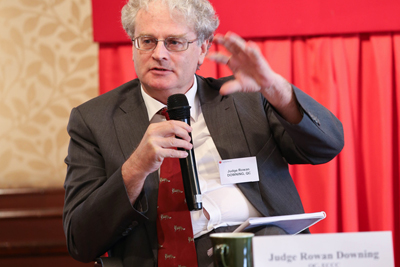
Having acted in leading judicial positions in the Pacific region, Judge Downing has held positions as Judge of the Court of Appeal and Supreme Court of Vanuatu, where he dealt with severe criminal matters and major civil claims. He has had two decades of international experience in law reform in areas of criminal and commercial law, human rights law and treaties, refugee law, administrative law, anti-corruption law and the investigation and prosecution of transnational crime. Judge Downing has also engaged with several multiparty organisations to enhance judicial independence and systemic integrity within legal systems in numerous countries. He has shown advocacy in many human rights cases and offered guidance to governments on human rights, primarily on the rights of women and children.
Professor Christopher Gane [Hong Kong]Dean, Faculty of Law, Chinese University of Hong Kong
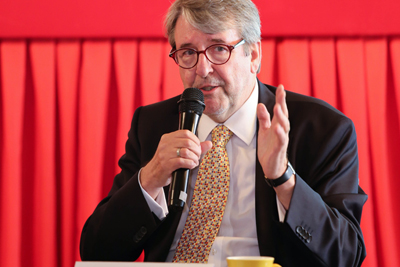
Professor Christopher Gane was appointed Dean of the Faculty of Law at CUHK in September 2011. Prior to that he held the Chair of Scots Law at the University of Aberdeeen. He is the author, co-author or editor of twelve books and more than fifty scholarly articles and papers.
He has acted as consultant to the Scottish Executive in respect of their Human Rights obligations under the Scotland Act 1998 and the Human Rights Act 1998, as advisor to the Scottish Parliament on a number of criminal law, criminal justice and criminal procedure Bills and as advisor to the Scottish Government on European Union criminal law and procedure.
Mr. Naoki Hayata [Japan]Currently Of Counsel at Bingham McCutchen Murase, Tokyo
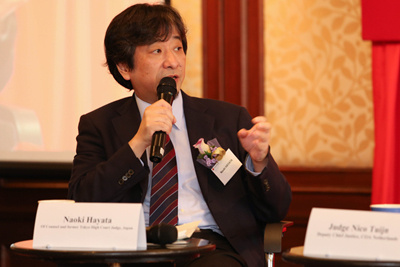
Specializing in financial services and advice on general corporate matters, Mr Hayata has also had experience with intellectual property, IP litigation, employment and labor, and general civil litigation. He also acts in insolvency matters, including civil rehabilitation and bankruptcy.
Mr Hayata is a member of Daini Tokyo Bar Asociation, and has served as a judge in the Tokyo District Court, Tokyo High Court, Intellectual Property High Court and General Secretariat of the Supreme Court.
Judge Agnieszka Klonowiecka-Milart [Poland]International Judge, Supreme Court
The Extraordinary Chambers of the Courts of Cambodia (ECCC)
United Nations Assistance to the Khmer Rouge Trial (UNAKRT)
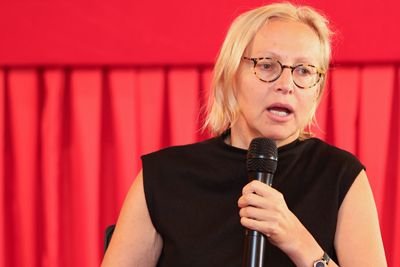
Appointed to the Supreme Court of Kosovo, Judge Klonowiecka-Milart has adjudicated on humanitarian and war crimes, genocide and terrorism. Also the leading international judge in the United Nations Interim Administration Mission in Kosovo, she is an expert in the drafting and reform of legislation.
Judge Klonowiecka-Milart was frequently invited to the Department of International Cooperation and European Law in the Polish Ministry of Justice, where she engaged in reviewing and altering law for compliance with international standards, especially those of the European Convention on Human Rights (ECHR) and the European Union.
Mr. Robert S. Pé [Hong Kong/Myanmar]Partner, Commercial Litigation at Orrick, Hong Kong
Advisor to Myanmar’s Daw Aung San Suu Kyi
A partner in Orrick’s Hong Kong office
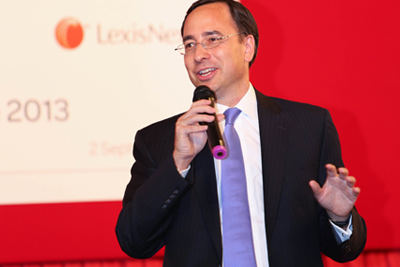
Mr Pe focuses his practice on international commercial litigation and dispute resolution. He is an adviser to Burmese leader and Nobel Laureate, Aung San Suu Kyi. Mr Pe has handled a broad range of contentious matters, including high-value international arbitrations in Hong Kong, London and Singapore under various rules including the HKIAC’s Administered Arbitration Rules, the ICC Rules, SIAC’s Arbitration Rules and the UNCITRAL Rules. He is also a CEDR accredited mediator and occasionally acts in arbitrator appointments.
Mr Pe has received many honours and awards, including being “Arbitration Lawyer of the Year in Hong Kong” for the 2013 Corporate International Legal Award. He has been described in Chambers Asia as “much in demand” and “well prepared, creative and highly effective”, in The Asia Pacific Legal 500 as “highly respected” and “a major figure in Asia-based arbitrations;” and in the PLC Dispute Resolution Handbook as “one of the region’s top litigators.”
Judge Nico Tuijn [The Netherlands]Deputy Chief Justice, Court of Appeal, Netherlands
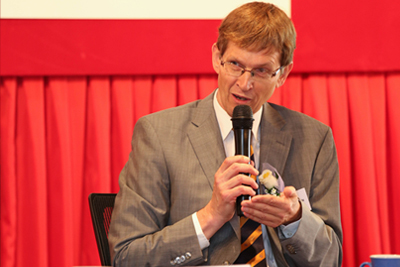
Having held various positions as a trainee judge in the Court of First Instance in Roermond, Netherlands where he dealt with commercial, family and criminal law cases, Judge Tuijn specialises in criminal law and served as Justice in Netherlands Court of Appeal. He has taken part in international legal projects to enhance the judiciary in Europe and Asia since 1985. Aiming for greater charities for children, Judge Tuijn was president of Foundation Anak Terlantar in Indonesia since 2008, which aims to alleviate child poverty and abuse. He has also served a stint at Indonesia’s International Monetary Fund, and as Deputy Chief Justice in s’Hertogenbosch Court of Appeal. In 2010, he co-founded a group for judges to facilitate international networking in the profession as he seeks for deeper judicial interaction transcending geographical boundaries.
Ms. Susila Sithamparam [Malaysia]President, Industrial Court
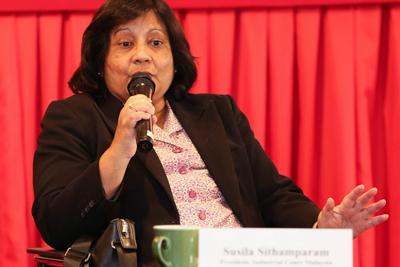
Ms Susila Sithamparam was appointed as the President of the Industrial Court on 16 November 2009. In the past few years, she has been involved in numerous high profiled industrial cases, where she has been continuously upholding social justice. In her capacity as the President of the Industrial Court of Malaysia, she has also been invited as a member of panels in various forums and conferences around the region, speaking primarily on industrial and employment issues.
Professor Simon NM Young [Hong Kong]Professor and Barrister, Faculty of Law, University of Hong Kong

Professor Young was the Director of the Centre for Comparative and Public Law and Deputy Director/Director of Research in the Department of Law from 2007 to 2013. He is a practising Hong Kong barrister and lectures criminal law, evidence and human rights.
Professor Young has acted as counsel in providing advice on key constitutional and public law cases, offering guidance to the Hong Kong Government on its Convention Against Torture screening mechanism and has led the ‘Continuing Legal Education’ programme in the Prosecutions Division of the Hong Kong Department of Justice since 2011.
Mr. Kevin Zervos, SC [Hong Kong]Director of Public Prosecutions, Department of Justice, HK
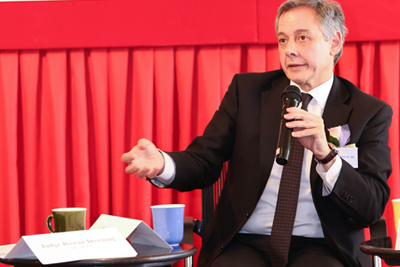
Director of Public Prosecutions in the Hong Kong Department of Justice, Mr Zervos has for the past twenty years specialized in credit card and currency frauds, banking and corporate frauds, infringement of intellectual property, money laundering and corruption. He was first attached to the Commercial Crime Unit where he acted in prosecutions for white-collar crimes, then was Head of Appeals focusing on human rights and later as Chief of Staff. Mr Zervos was thereafter appointed Senior Counsel in Hong Kong, and completed a Master of Laws (Human Rights) at the University of Hong Kong. He has wide experience in the trial and appeal process in all areas of law.
Before coming to Hong Kong, Mr Zervos worked with the Special Prosecutor’s Office in Australia and was responsible for investigating and prosecuting large-scale revenue frauds. He was later Senior Assistant Director in the office of the Commonwealth Director of Public Prosecutions at the Melbourne and Sydney Offices and headed the Major Fraud Section. Mr Zervos was also General Counsel to the Independent Commission Against Corruption in New South Wales from 1989 to 1992.